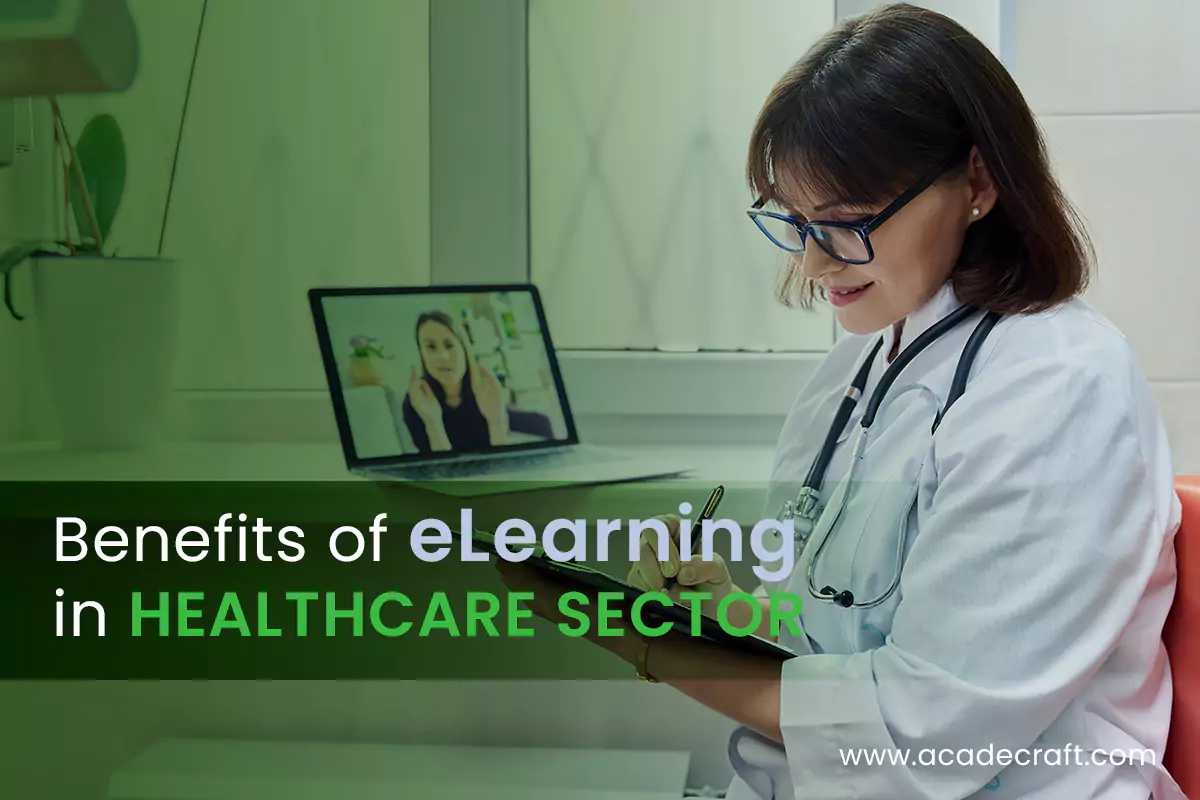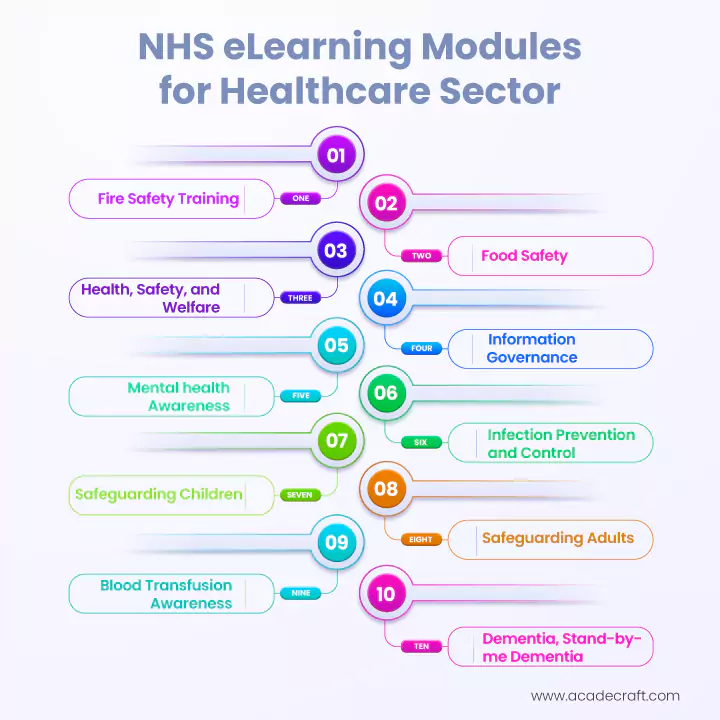
The use of eLearning for healthcare sector has seen rapid expansion in recent years as technology continues to advance. eLearning allows health professionals and experts to access learning materials from any location, making it convenient to access educational materials and stay updated with the latest developments in their field. Elearning also facilitates improved communication between health practitioners, allowing for easier collaboration and sharing of information. It can be particularly useful when treating complex medical conditions, allowing practitioners to work together to find the best course of action.
The Healthcare world is transforming rapidly, and eLearning is important in keeping healthcare professionals updated on the latest developments. With the ability to deliver training materials on demand, eLearning has become an important component of the healthcare landscape.
eLearning in the healthcare sector provides various benefits for patients as well as for professionals in the sector. For patients, eLearning can help ensure that the experts and professionals are better informed and more familiar with the latest medical treatments and technologies. It will improve patients' quality of care and help them stay updated on their healthcare needs.
Our robust eLearning services can assist with quick and comprehensive training on the latest medical procedures and technological advancements without expensive in-person training for healthcare providers and employees in the sector. Moreover, eLearning can help healthcare organizations save money on travel costs while reducing staff time away from their primary duties.
On the other hand, the benefits for providers and patients, eLearning can also help in improving healthcare outcomes. With eLearning, providers can get access to the latest research, developments, research, and best practices, allowing them to make informed decisions on patient care. It will also help in reducing medical errors while assisting providers to stay compliant with the changing regulations in the healthcare sector.
On the whole, eLearning for healthcare is transforming the industry by providing providers and patients with the necessary training and resources to stay informed and up-to-date on the latest developments. With the increasing need for quality healthcare, eLearning will continue to be important in ensuring providers and patients get the best care possible.
Also Read: Challenges of Online Learning and How to Overcome Them
eLearning offers a practical way for healthcare professionals to learn effectively and comfortably to provide the most appropriate healthcare services. From being cost-effective to being accessed anytime and anywhere, here are the top 5 benefits of eLearning for the healthcare sector.
Healthcare professionals and providers often find it challenging to attend classroom training due to their busy and unpredictable schedules, including long shifts and on-call duties. However, eLearning is becoming increasingly popular and widely accepted. It offers a flexible and digital learning environment that allows healthcare workers to receive training without interrupting their working hours.
eLearning in healthcare uses text and graphics to help learners connect complex concepts to simpler ones. A Report by the World Health Organization has found that eLearning is just as effective, if not more so, than traditional learning methods for healthcare professionals.
E-learning is being used to provide healthcare professionals with continuing medical education (CME) credits. It is important because it helps to ensure that healthcare professionals are up-to-date on the latest medical knowledge and research. For instance, the American Medical Association offers an online library of CME courses in various topics to help physicians stay updated on the latest medical advancements. E-learning is convenient and cost-effective, allowing healthcare professionals to access the latest medical information and earn CME credits without having to be physically present in a classroom. Additionally, it enables healthcare professionals to complete CME credits at their own pace, allowing them to focus on relevant topics to their job.
Healthcare organizations are using e-learning to train new employees on their policies and procedures. This helps ensure that new employees can provide safe and effective care to their patients. It is like providing a map to a new city so that with the right knowledge and preparation, employees can navigate their work environment with confidence. Digital learning also provides a sense of security, as it gives professionals an understanding of the services and protocols in place. Hence, they know what is expected of them in their new roles.
eLearning educates patients about health conditions and management. This empowers patients to make informed care decisions. E-learning allows patients to access information about their health conditions from the comfort and privacy of their homes. Additionally, e-learning allows patients to learn at their own pace and take the time to review important concepts. This helps them to understand their conditions and make more informed decisions about their healthcare.
Telehealth has been found to provide access to resources and care for patients in rural areas or areas with provider shortages, to improve efficiency without higher net costs, to reduce patient travel and wait times, and to allow for comparable or improved quality of care.
Healthcare professionals can utilize an eLearning system as a resource for their inquiries. If they recall reading about a certain topic within the system but cannot recall the specifics, they can easily access the system and locate the necessary information within minutes. Additionally, eLearning systems often come equipped with search engines, simplifying the process of retrieving information. Some healthcare facilities may choose to incorporate a section within their eLearning system that provides updates on previously covered topics or important news related to the facility. This section can also serve as a message board, making the eLearning system a multi-functional tool.
eLearning has proven to be a valuable tool in the healthcare industry. The NHS has developed numerous eLearning modules to aid in the training and education of healthcare professionals. These modules cover various topics, from patient care to medical procedures, ensuring healthcare workers access the latest information and techniques.
For instance, the NHS eLearning modules include a module on infection prevention and control, which covers how to protect patients, staff, and visitors from the spread of infection. This module covers miscellaneous topics, from hand hygiene and the appropriate usage of personal protective equipment to cleaning and disinfection protocols and the safe handling and disposal of clinical waste. It also discusses the importance of effective record-keeping and implementing policies and procedures that ensure the safety of all involved.
The convenience of eLearning also allows for flexible learning, allowing healthcare professionals to learn at their own pace and on their schedule. With the continued development of eLearning technology, the possibilities for improving healthcare through education are endless. A few of their online training include:
These courses provide professionals from the health sector with the knowledge and skills to perform safe and effective blood transfusions. They also focus on raising awareness about the importance of blood donation and the potential risks associated with blood transfusions. They cover topics such as dementia, providing advice on how to care for people with dementia. It also helps to raise funds for research and education and to provide care and support for those affected.
Also Read: E-learning vs Virtual Learning: What's Best For You?
If you're an employer in the healthcare industry, consider implementing an eLearning system or utilizing our gamified learning solutions to support your employees. You can also incorporate our corporate custom elearning content development services into the eLearning modules for your professionals. With this method in place, your staff can access a wide range of learning materials and resources anytime and anywhere. It can be particularly useful for busy people who find attending traditional classroom-based training programs difficult.
By implementing an eLearning system, your medical staff can become proficient in essential skills and acquire new knowledge to help them deliver top-quality patient care. It can also help you retain your best employees, as they will appreciate your investment in their professional development. It is like giving a master chef the finest ingredients. With the right tools and resources, they will be able to create a meal that will be a gastronomic delight. In the same way, the eLearning system will empower your medical staff to provide the best possible care for their patients. With the eLearning system, your medical staff can stay up-to-date on the latest medical knowledge and techniques. It will help them provide better care and improved results for their patients. It will also build trust between your organization and your patients.
Therefore, it is evident that eLearning for healthcare sector is an effective way to support your healthcare employees' ongoing education and development. By exploring this option, you can help your staff stay up-to-date with the latest advancements and provide the best possible care to patients.
References:
Word Health Organization
NHS Curriculum
Share